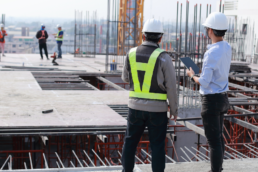When you’re on the verge of launching a new construction or renovation project, it’s easy to be tempted by the idea of sidestepping the permitting process to save time and money. However, the consequences of bypassing this crucial step can be far-reaching, often incurring more cost than if the process was followed from the start.
At Commun-ET, we’ve seen it all, and we’re here to highlight the real costs associated with avoiding the permitting maze.
1. Heavy Fines and Penalties
Every city or municipality has its unique set of construction regulations and standards, established to ensure safety, preserve local aesthetics, and uphold community standards. When these regulations are violated, the penalties aren’t merely a slap on the wrist. In many cases, the fines levied against unpermitted projects can be astronomical, sometimes amounting to several times the cost of the permit itself. This is not just a strategy to discourage non-compliance but a reflection of the potential risks and liabilities these projects can pose. Additionally, frequent inspections can be anticipated, adding to the project’s ongoing costs.
2. Project Delays
Time is money, especially in the world of construction. Every day a project is halted means potential lost profits and increased overheads. Beyond the immediate financial implications, delays can also strain relationships with stakeholders, contractors, and investors who are all working within tight schedules. Unplanned halts to work due to permit issues can even lead to renegotiation of contracts or higher costs if subcontractors and rentals are involved. Moreover, restarting a project after obtaining the proper permits can sometimes mean undoing completed work, leading to wastage of both time and resources.
3. Safety Concerns
The primary reason behind the permitting process is to ensure the safety and well-being of everyone involved. It isn’t merely about bureaucratic red tape. Permits ensure that projects adhere to modern construction standards, which have been developed through years of industry expertise and lessons learned from past mistakes. Unpermitted work can mean compromised structural integrity, faulty wiring, or inadequate plumbing. Such lapses not only endanger the inhabitants but also the neighbors and surrounding community. In case of accidents resulting from such issues, the property owner might face lawsuits and significant liabilities.
4. Lower Property Value
The real estate market is incredibly discerning. Home inspectors, appraisers, and savvy buyers always do their due diligence. If a property is discovered to have unpermitted modifications or constructions, it immediately becomes less attractive. Potential buyers might see it as a risk, leading to reduced offers or even pulling out of a sale altogether. Even if a sale goes through, the owner might have to accept a significantly lower price than the market value.
5. Difficulty in Securing Future Permits
Your reputation with local municipalities is crucial. If you’re known to have bypassed the permit process before, you might find yourself under increased scrutiny for future projects. This heightened oversight can mean lengthier approval processes, more inspections, and increased scrutiny for all subsequent endeavors, even if they are completely unrelated to the previous unpermitted work.
6. Legal Repercussions
The legal ramifications of bypassing permits extend beyond just fines. In some extreme scenarios, local authorities might mandate the removal of the unpermitted structures entirely. This means not only absorbing the cost of the initial construction but also bearing the cost of demolition and reconstruction. Plus, legal disputes can drag on, leading to additional expenses in terms of lawyer fees, court costs, and potential settlement amounts.
7. Increased Insurance Costs
Skipping the permitting process can have a direct impact on insurance premiums. Many insurance companies rely on permits as evidence that work was done up to code and meets safety standards. Without the necessary permits, insurers may deem the structure riskier to insure or even refuse coverage entirely. If an incident occurs that can be traced back to unpermitted work, claims might be denied, leaving the property owner with huge out-of-pocket expenses.
8. Compromised Relationships with Contractors
Reputable contractors prefer to work on projects that adhere strictly to local regulations. If you sidestep the permitting process, you might find it challenging to attract and retain quality contractors for your project. On the other hand, those willing to work without the proper permits might be cutting other corners, compromising the quality and safety of the build.
9. Difficulty in Refinancing
Just as permits can affect property values and insurance, they can also influence your ability to refinance your property. Lenders, like insurers, view permits as evidence of compliance and safety. Without them, lenders might see the property as a high-risk asset, which can lead to higher interest rates or even outright denial of your refinancing application.
10. Loss of Peace of Mind
Perhaps one of the most understated costs of bypassing the permitting process is the continuous anxiety it can induce. Living or working in a property with unpermitted changes always carries the shadow of potential issues arising. Whether it’s the fear of getting caught, concerns about safety, or simply the knowledge of not doing things the right way, it’s an ongoing stress that can be easily avoided by securing the necessary permits.
Wrapping Up
The process of construction and renovation is intricate, laden with steps that may seem cumbersome, but are designed to protect property owners, workers, future inhabitants, and the broader community. Skipping the permit process is not merely a game of dodging bureaucracy; it’s a decision that comes with multifaceted consequences, both immediate and long-term. Whether it’s financial penalties, strained relationships, or the nagging worry about potential repercussions, the costs of avoiding permits far outweigh the perceived benefits.
At Commun-ET, our goal is to simplify this process for you. With extensive experience, a keen understanding of local regulations, and a genuine commitment to the success and safety of your projects, we’re your trusted partners in navigating the permitting labyrinth. We believe in doing things right, from the start.
Embarking on a new project? Ensure it stands on a solid foundation of compliance and excellence. Visit Commun-ET.com today, and let’s set your project on the path to success, free of unnecessary hurdles and worries.



